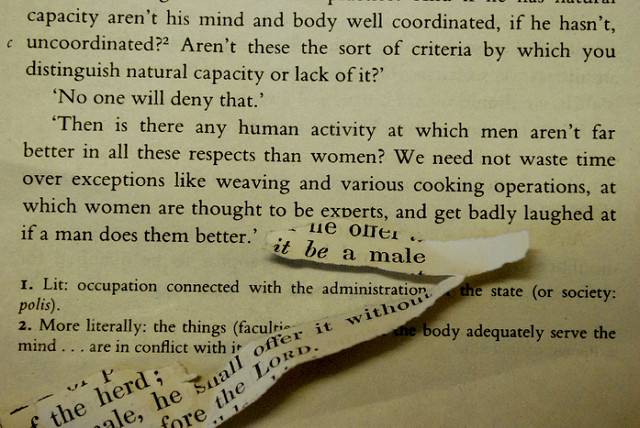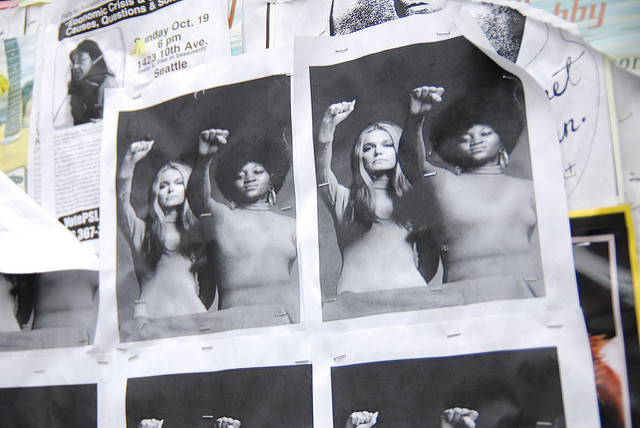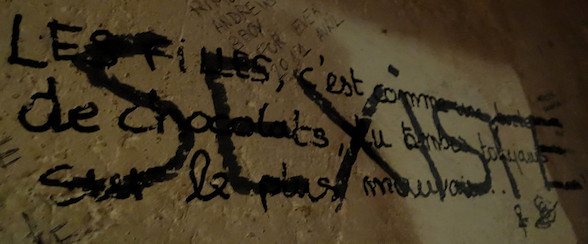In the mid-1970s, Robin Lakoff, professor of Linguistics at the University of California, Berkley, established Language and Gender Studies as an academic discipline with the publication of her essay, Language and Women’s Place. Lakoff’s essay prompted an examination of the role that language plays in gender roles as a means of sexual discrimination and oppression. People started to wonder: does the structure and usage of language contribute to the subordination of women? It was around this time that a demand for ‘gender-fair language’ emerged, and the struggle to implement it has proved just as difficult as achieving gender equality.
Agreeing with the claim that language should be gender neutral depends on whether we agree that the way language is constructed and used has an impact on our worldview. Dale Spender, author (or perhaps I should say authoress?) of ‘Man Made Language’, argues that language is ‘our means of classifying and ordering the world’. It is through language that we learn; we discover who we are; it is even perhaps how we determine who we are, therefore language systems arguably have an influence over our perception of ourselves and the world. In the words of British philosopher Alan W. Watts, ‘“We seldom realise, for example, that our most private thoughts and emotions are not actually our own. For we think in terms of languages and images which we did not invent, but which were given to us by our society”.

Both the French and German languages have been criticised as inherently sexist, in that they render women invisible due to the principle of ‘male-as-norm’. In these languages, a mixed group of women and men would be referred to using the ‘generic masculine’, and it is only when talking specifically about women that feminine suffixes or agreements are employed. When denoting a female in German, the female suffix –in is added to the standard male form of a noun. Linguists and feminists condemn these conventions, as women are presented as an extension of and thus dependent on men. The symbolic order of our society, based on the myth of male superiority and the socially imposed dichotomy of masculine and feminine roles, therefore underlies the German and French languages.
The relationship between the French language and the French people is an interesting one. The historian Fernand Braudel once said ‘la France, c’est la langue française’ (Translation: France is the French language). As a secular republic, the French are not united by religion, ethnic origin or ancestry, but rather by principles, values and a common language. The French poet Alain Borer claims that it is upon the French language that the French state was founded, and the language is tightly linked to French identity and mind set. In French, attention is constantly drawn to the issue of gender thanks to grammatical agreements; men and women are constantly differentiated between. Might this influence the French worldview, especially as the French language and identity are said to go hand in hand?

These are not the sole offenders, either. Most European languages are sexist in their usage and/or structure, in that they are vehicles that transmit a worldview biased towards men. In English, for example, titles are used as a means of signalling females’ sexual availability and relationship to men. Mrs Smith is married; Miss Smith is single and available (and please put her out of her single misery); Ms Smith is probably a man-hating feminist, whereas Mr Smith is of course not defined by his marital status.
Acknowledging that languages are sexist is one thing, but finding an agreed solution is easier said than done. Firstly, forcing language change is a controversial idea, as is reflected by a 1992 study into French and German attitudes to institutional language reforms: between 70% and 95% of the general public was hostile to the language reforms. The opinion is generally favoured that languages are fluid, constantly evolving, reflecting cultural practices. Policing language is viewed as unnatural. Secondly, opinions vary over which solution is best. In the case of German, feminist linguists have suggested at least ten different ways of avoid the generic masculine in third person plural, all of which carry their pros and cons. For example, despite increasing the visibility of women, some suggestions have been criticised as not being inclusive of the LGBTQIA community.Then, even if an option was agreed and implemented into language law, it’s difficult, if not impossible, to regulate language usage in the private sphere.
Mrs Smith is married; Miss Smith is single and available (and please put her out of her single misery); Ms Smith is probably a man-hating feminist, whereas Mr Smith is of course not defined by his marital status
Today, over 40 years after the publication of Language and Women’s Place, language continues to be used as a means of belittling or subordinating women. The Olympic Games in Rio provided countless examples of this, with Europeans at the heart of the ignorance. During the games, French ex-rugby player Fabin Galthié offered up his thoughts on the France vs United States female rugby match: “Les Françaises sont beaucoup plus mignonnes, beaucoup plus féminines que les Américaines”. (Translation: The French are a lot cuter, a lot more feminine than the Americans.) It is safe to say he didn’t analyse the male rugby team in the same way. The Daily Mail also referred to swimmer Katie Ledecky as ‘the female Michael Phelps’, and Simone Biles shattered comparisons with male athletes, stating ‘I’m not the next Usain Bolt or Michael Phelps, I’m the first Simone Biles.’ These examples demonstrate the way that women are viewed as inferior to, and only qualified by, men.
The idea that language is not merely a means of voicing ideas, but rather a shaper of ideas, also known as linguistic relativity or the Sapir-Whorf hypothesis, is much contested in linguistics and warrants much further exploration than is possible in this article. Still, if accepted, the theory is perhaps quite worrying when considering the consequence of codified sexism in languages such as English, French and German. If the very language we use to fight gender inequality is perhaps contributing to it, how can we ever win? We’re arguing for gender equality with a male voice.





